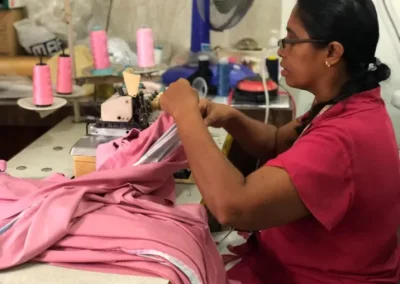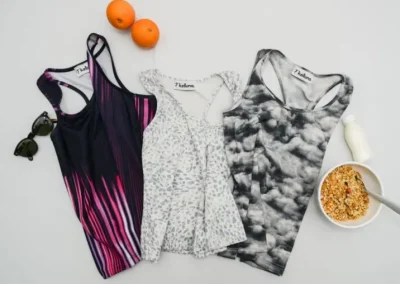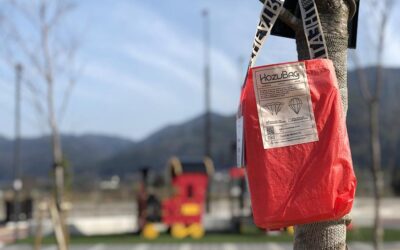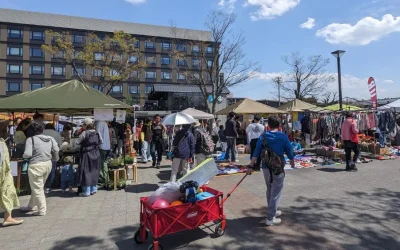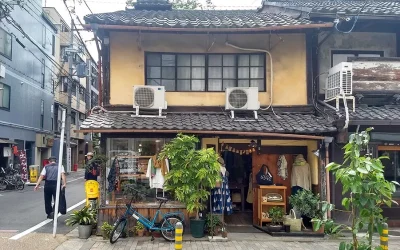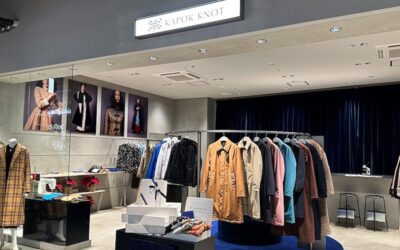Japan’s sportswear brand “kelluna.” inspired by Sri Lankan women’s self-love
In recent years, Sri Lanka, where the political situation has been unstable due to the serious economic crisis, has repeatedly held demonstrations demanding the resignation of the government since March 2022. In July 2022, a large-scale protest demonstration spread, and the situation became serious, with some demonstrators occupying the official residence of the president in Colombo, the largest city in Sri Lanka (*1). In addition to the recent instability in the country, many women have lost their families and jobs due to the conflict that began in 1983.
To support such Sri Lankan women, “kelluna.” is developing a fitness wear brand with the theme of “self-love,” including the idea of taking care of one’s self. We interviewed kelluna. representative Yuna Maekawa about her experience working in Sri Lanka as an employee of the Ministry of Foreign Affairs, how she started the brand and her thoughts behind her message, “self-love.”
Voices of Sri Lankan women affected by conflicts
From 2017 to 2019, while working at the Embassy of Japan in Sri Lanka as a specialist investigator for the Ministry of Foreign Affairs, she was in charge of making policy proposals. However, she began to see the limits of what could be accomplished through policy alone.
“While communicating directly with local women through my work, I sometimes felt that there was a disconnect between the content of policies and these women’s needs. Policy proposals have an impact both financially and diplomatically. However, since policy is enacted by the Japanese government, I saw that the main focus was placed on infrastructure and laws. There was a limit to what we could do for women themselves.”
Through interaction with local women, Maekawa said that she was deeply saddened by the plight of the women, such as losing their families due to the civil war (Ccashes between Sinhalese and Tamils from 1983 to 2009 resulted in over 70,000 casualties).
“Sometimes their husbands and sons who went to war during the conflict did not return. In fact, many of them have passed away, but there are many women who are mentally driven to search and wait for their families. Without husbands or sons, many women have no choice but to earn their own income. Even now, more than a decade after the end of the conflict, given their age and previous work experience, it is difficult for them to enter the labor market.”
Empowering Sri Lankan women and their community
Then, it was the women’s community in Sri Lanka that inspired Maekawa to launch the brand.
“I was impressed by the words of Sri Lankan women, ‘If my family doesn’t come back, I want a community where I can smile’ and ‘I want to make a living on my own.’ When I found out about these women who have a strong motivation to work even without funds or skills, I knew I had to do something.”
Maekawa began preparations for starting a business with the desire to create a community that will make them smile and give them working skills. Also, she felt uncomfortable with the way sales were an extension of the conventional “international cooperation.”
“When I was preparing to start a business with the desire to employ Sri Lankan women, I began to question the volunteer-like sales method of ‘If you buy this, you can help this country.’ By doing so, we can create jobs for local people, but I also thought about what we could provide Japanese women as buyers. At that time, the keyword came to my mind, which was ‘self-love.’”
Free yourself from the trap of appearance-based beauty and pursue self-love
“I myself fell into the idea that I had to be thin. In my 20s at the time, I was repeatedly struggling with overeating and anorexia. Though I had always loved exercising, it became merely a way to lose weight. As a result, I was exhausted both physically and mentally and spent my 20s not feeling happy.”
“However, when I went to the United States to study, I realized that being thin is not the only thing that makes you beautiful. People who are confident are beautiful. Such awareness inspired me to start exercising so that I could smile, and after that, I gained weight and became healthier. Through these experiences, I started to think I wanted to spread the fitness which makes Japanese women smile.”
Thus, Maekawa launched the fitness wear brand “kelluna.” Maekawa’s feelings for women in Sri Lanka and Japan are included in the brand name “kelluna.”
“In Sinhala, one of Sri Lanka’s official languages, ‘kella’ means ‘woman.’ Also, many Japanese female names end with ‘na’ like my name, so I named my brand “kelluna.” hoping that Sri Lankan and Japanese women join forces. The period evokes a sense of completion or accomplishment amongst women.”
Sharing stories of diverse beauty
In fact, Maekawa focuses on the problems that many women actually face and are in the process of overcoming. By sharing these women’s stories, she promotes the concept of self-love.
“At kelluna., we are conscious of representing the real women around us, such as using not only slender models but those of various shapes and sizes, including plus-size models. Even women whose looks are “nice” from the outside have worries about their appearance. However, you can overcome them through self-love. I was also active in posting my own real process in pursuit of self-love on my blog.”
Maekawa says that through the brand’s activities, she feels the strength of Sri Lankan women’s self-love. She aims to create a relationship in which Sri Lankan and Japanese women can empower each other across borders.
“Sri Lankan women show their belly and arms when they wear national costumes, but I get the impression that they don’t really feel shame about their own body shape or that of others. Perhaps they understand the diversity of “beauty” and have a high sense of self-affirmation. I want to convey the message of fitness and self-love through this same sense. We aim to create a relationship that empowers each other, rather than merely sending a charitable message such as, “If you buy this, you can help Sri Lankan women.”
Aiming for a community that enhances self-love across borders
Maekawa, who has operated the brand with the keyword “self-love,” says that she is encouraged by the voices of customers.
“I was happiest when I received a message from someone who claimed they previously had no self-confidence and was depressed, saying, ‘I resonated with the concept of self-love and was moved.’ As for myself, even though I’ve become more accepting of my body since I was in my 20s, I still have days when my self-esteem drops. However, I want everyone to see me as ‘someone whose self-love is still developing,’ and I want them to cherish even that kind of self.”
Maekawa also feels that starting the brand has made positive changes for women in Sri Lanka.
“I’m grateful to receive more and more smiles from our Sri Lankan female employees. When I first started the brand, I sometimes felt a sense of distrust towards me as a Japanese person who came from outside. However, as the brand has continued over the years, they have come to sense that I have a great deal of determination. The number of people who said to me, ‘Yuna is our family,’ has increased, and the barriers I used to feel have disappeared. At the same time, I feel that we have been able to create the kind of joyful community that we envisioned in the beginning.”
In the future, Maekawa will continue to share the importance of self-love through kelluna. and wants to try new ways of communication.
“I used to think that women tend to have a rather limited concept of beauty, but I think that the harmful idea of social expectations is pervasive regardless of gender. That is why, in the future, I want to make efforts to approach diverse beauty beyond gender, such as increasing the number of unisex items. Also, we didn’t originally plan to run an apparel brand, but started the brand because of the worldview we wanted to achieve. Therefore, I would like to share Sri Lankan culture and self-love in words through blogs, radio and so on, in addition to product sales.”
Originally published on Zenbird Media.

